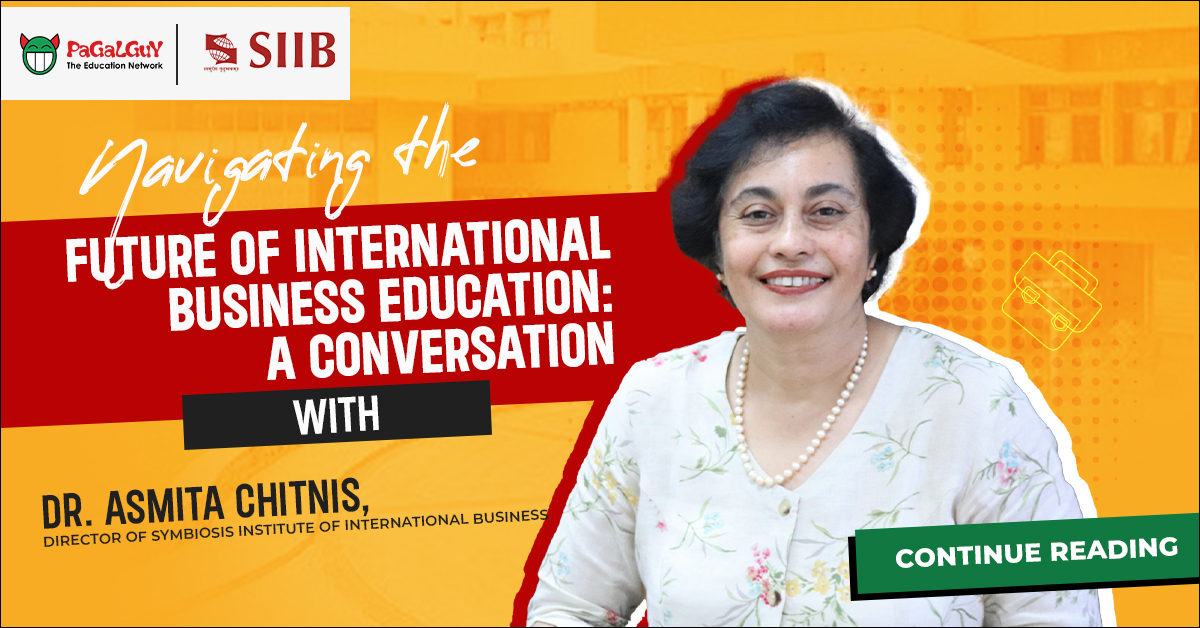
In an ever-evolving business landscape, the demand for individuals and leaders equipped not only with essential skills but also a research-oriented mindset is constant. The ability to identify emerging trends before they become mainstream is crucial. This necessity becomes even more apparent when business schools embrace a similar approach. The embodiment of this dual strength in research and academics, as well as practical skills, is exemplified by leaders within business schools.
A notable figure in both academic and leadership realms is Dr. Asmita Chitnis. Her formidable presence is marked by a rich background of experience and expertise. Holding a Ph.D. in Operations Management and a Post-Graduate degree in Statistics, Dr. Chitnis has navigated a distinguished career path, seamlessly blending research and education. Her journey commenced as a researcher at the National Institute of Bank Management (NIBM), where she made substantial contributions to projects commissioned by the Reserve Bank of India (RBI).
Her trajectory took a transformative turn as she transitioned into the realm of education, accumulating over 32+ years of invaluable experience in academic and corporate training. Dr. Chitnis has made an enduring impact on institutions such as the National Institute of Bank Management (NIBM), the National Insurance Academy (NIA), and the Open University of British Columbia (OUBC), where she served as an educator and mentor. Her expertise spans a wide spectrum, with research interests encompassing Performance Evaluation, Benchmarking, Forecasting, and others, as reflected in her commendable record of published papers in these management domains.
Currently holding the positions of Professor and Director at the Symbiosis Institute of International Business (SIIB), Dr. Chitnis plays a pivotal role in shaping the academic landscape and guiding aspiring business students towards a promising and brighter future.
In this exclusive interview feature, we explore the insights, expertise, and vision of Dr. Asmita Chitnis, a distinguished leader and educator. Our discussion illuminates why SIIB is an outstanding option for students seeking an MBA education. Join us as we uncover the wisdom of Dr. Chitnis and understand why SIIB shines as a beacon of excellence in the field of international business education.
Access full interview only on PaGaLGuY YouTube Channel – Subscribe Now
Q1. With over two decades of experience in education, Dr. Chitnis, could you elaborate on your journey from the banking sector to academia at SIIB and shed light on the motivations behind this career transition?
Ans: Honestly, my career started in 1990 when I joined the National Institute of Bank Management. Back then, education wasn’t part of my career plan; my interests were more geared towards analytical work and research. Interestingly, I took on an assignment that unexpectedly led me into education. Around 1990, after about a year and a half of research, I made the shift to education, and it was during this transition that I discovered my genuine passion for teaching.
In those early days, I was quite young, instructing undergraduate students. The college principal even suggested that I wear a sari to project a more mature image, hoping the students would perceive me as a teacher.
Embarking on my journey in education, I realised how incredibly fulfilling it was. One aspect that stood out to me was the constant influx of new students each year. Teaching proved to be a dynamic profession, and being surrounded by young, eager learners was both motivating and a catalyst for my own ongoing learning. The educational environment, always evolving and vibrant, became something I deeply appreciated over the years. Despite stumbling into this field by chance, I’ve genuinely found my passion in education, thoroughly enjoying what I do. That’s how my journey unfolded.
Q2. So, can you tell us how this accident happened?
Ans: Throughout my journey, I’ve never had to go through the process of interviewing for a position. It’s quite a unique experience, something that doesn’t happen to many people. In each instance, there was a suggestion that there was an available position, a full-time assignment. I was introduced to a specific educational institute through a professor, and that’s how my journey began. This trend persisted when I joined Symbiosis. The opportunity was presented to me by the then Pro-Chancellor, who recommended that I join them on a full-time basis. For every role in between, I was consistently referred; I never had to submit applications. Reflecting on it now, it does seem uncommon, but that’s how my path unfolded. Honestly, I find it a bit peculiar, too. It’s not often you hear about people having a similar experience. I never actively applied for positions like dean or director; I was always in the right place and time.
Q3. You mentioned being logically driven as an individual, which can be challenging when dealing with people, especially when managing professors. Could you discuss how you’ve successfully blended your logical mindset with effectively guiding others toward your vision throughout your experience?
Ans: In education, the established processes play a significant role. Teachers have a high degree of control in the classroom, and well-drawn processes guide the educational journey. This differs from corporate settings, where a leader’s words and thoughts may carry more weight. In education, the logical mindset fits well, as processes are well-defined, and there is no undue burden on any one person. The classroom primarily revolves around the interaction between the teacher and the students, allowing for a great deal of freedom.
As a leader in an educational institution like SIIB, we benefit from precisely defined processes. We start and end our academic year at specific times, and these processes provide a framework. However, within that framework, there’s considerable freedom for all involved. In my role as a director, I don’t interfere with the teaching process. The teachers have complete control, and I only set the broader structure and expectations. When I was a teacher myself, I enjoyed similar freedom and autonomy. Even now, when I teach, I have the authority over my course, but I value the feedback and interaction with my students. This interaction is primarily between the tutor and the students and doesn’t involve the leader, allowing for effective teaching and learning.
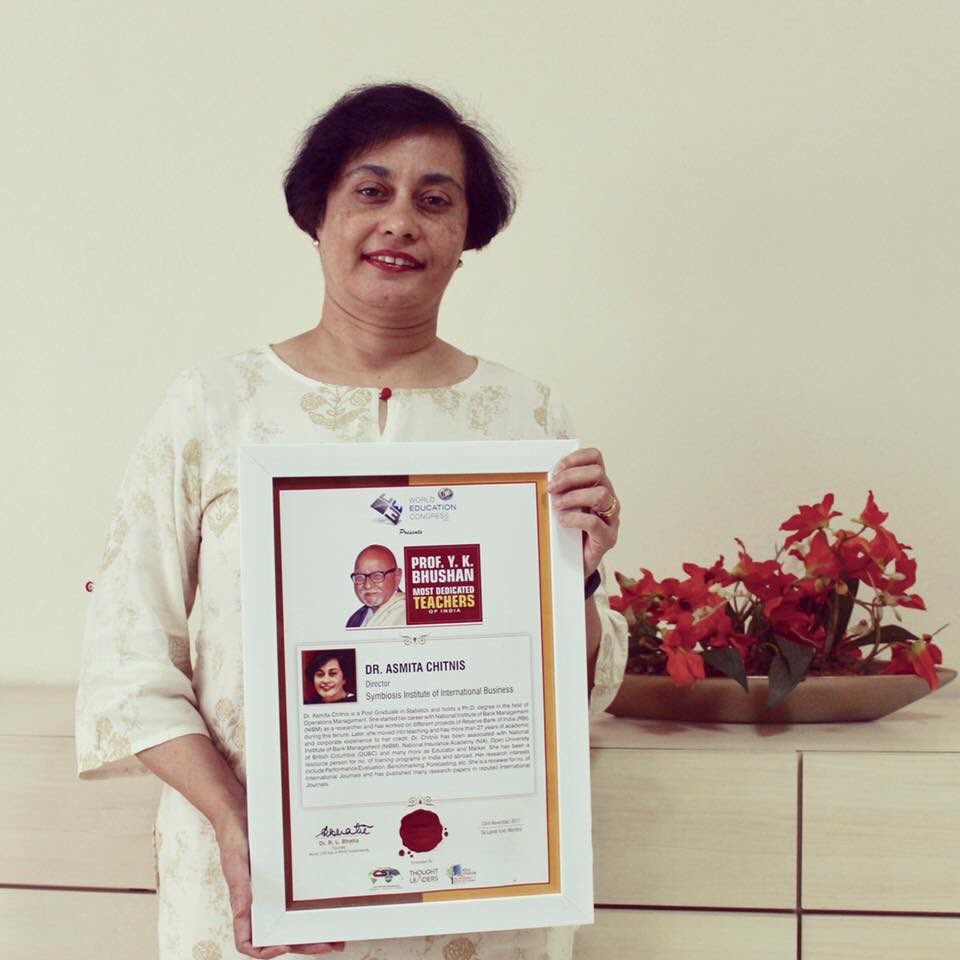
Q4. In academia worldwide, a prevalent sentiment is the difficulty in encouraging professors to alter their perspectives and embrace new ideas. How have you successfully influenced and propelled progress in this context as a leader?
Ans: Over the years, I’ve noticed a generational shift in the student-teacher dynamic, particularly with the advent of the Internet. In the past, students were heavily reliant on teachers and books for knowledge. Nowadays, information is readily available, but the value of a teacher lies in their ability to make that knowledge relevant and engaging. The most beloved teachers are those who can connect with their students and bring real-world relevance to their lessons.
When it comes to business education, it’s clear that many students, at least in India, pursue it to secure a good job. Recognising this shared objective is crucial. Gathering student feedback is a mandatory part of the course, typically conducted mid-semester and at the end. However, I encourage my colleagues, including me, to maintain an ongoing dialogue with our students to ensure they receive what they expect. Being open to change is vital. I’ve seen instances where professors stick to their own methods without regard for the course title or student needs, which can be disastrous. We initiate the change process by remaining open to feedback and proactively seeking it. We regularly collect feedback, conduct group meetings with academic leaders, and host monthly open houses where students can voice their concerns and questions. We prioritise addressing these concerns promptly because this generation is quick and demanding. By maintaining regular communication and addressing their concerns, we ensure that our courses meet their expectations and needs.
Q5. From your viewpoint, could you identify the key trends you’ve recently observed in MBA education? How will these trends signal the direction in which professional education may evolve?
Ans: Many of our students come to our MBA programme with prior work experience, mostly from the IT industry. However, we’ve recently seen a shift with students also joining from the manufacturing sector. These individuals, with two to three years of industry experience, realise that further qualifications are necessary for fast-track career growth. Their top priorities are rapid career progression and staying updated with the latest industry trends. Technology has become integral to all sectors, making it essential for students to understand technologies like AI, ML, and analytics. We at SIIB adapt our curriculum based on demand, often incorporating alumni-led workshops to keep students updated.
For example, we introduced product management workshops three years ago, making it a 2-credit course due to its growing relevance. Similarly, we’ve included topics like well-being and Six Sigma certification based on feedback and industry needs. Our process involves starting with workshops, assessing feedback, and integrating successful topics into the curriculum, evolving them from electives to mandatory courses when necessary.
I have personally observed the significant relevance of mental health in the lives of today’s young professionals. To address this, we’ve implemented a series of classes focusing on yoga, meditation, and functional workouts. What started as individual sessions has now evolved into a dedicated single-credit course. Additionally, we’ve incorporated multiple electives that align with current market requirements, whether in the realm of digital marketing or business analytics. These electives, initially introduced as supplementary courses, have now become integral components of the overall curriculum we offer.
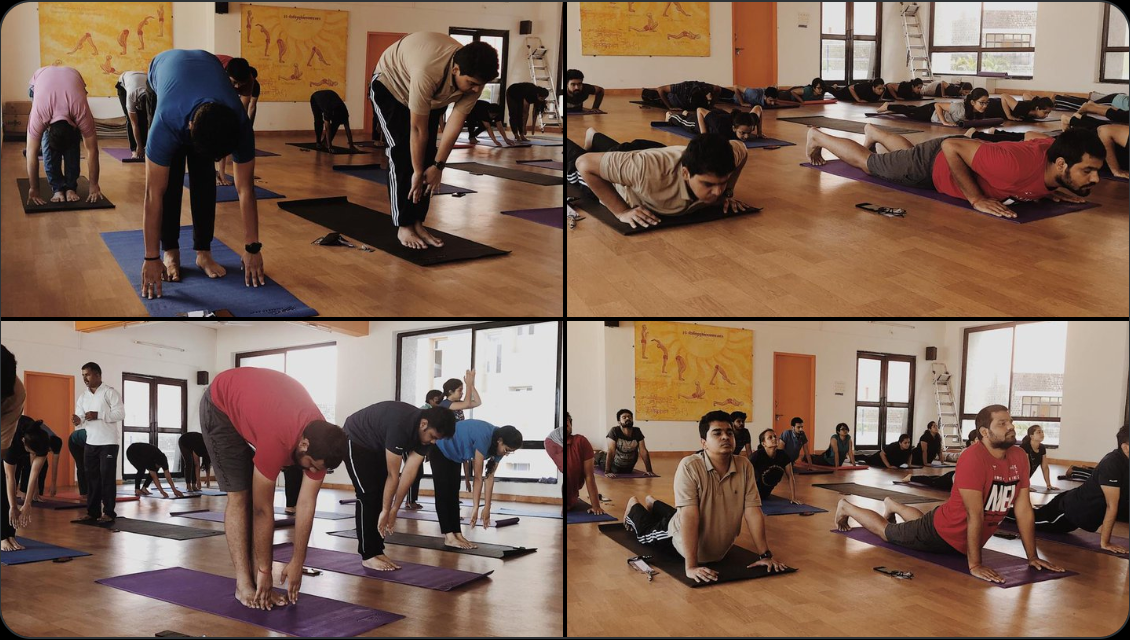
6Q. How do you determine the appropriate times to take industry feedback into consideration, particularly considering the industry’s susceptibility to changes in economic conditions? While your previous response touched on this, I’m interested in gaining further insights on the subject.
Ans: As I mentioned earlier, I identify as a logical person with a stronger inclination towards the left side of my brain. Before embarking on any initiative, we conduct thorough research. Over the years, I’ve cultivated strong relationships with recruiters, and my approach to our interactions is generally open and honest. I consistently emphasise to them that if they are seeking specific skill sets in potential hires, they also have a responsibility to contribute to our students’ training. Leveraging my extensive network of alumni in reputable companies, I prioritise these connections when addressing the educational needs of our students.
Throughout the year, we are actively involved in ongoing grooming and education. Occasionally, a corporate partner may express disappointment, citing expectations for higher-quality candidates. Such situations are not uncommon and are part of the process, often influenced by the recruiter’s preferences, expectations, and ideology.
In most cases, however, corporate partners are not overly upset. When concerns are raised, we propose a solution: suggesting they send their representatives to interact with our students or provide training to align student skills with their expectations. This collaborative approach has consistently proven effective over the years. I recall an example from about 15 years ago when a company had particular skill requirements.
Upon approaching me, I suggested they send someone from their business to conduct a day or two of training for our students. They agreed and organised a full-day workshop. When they returned for recruitment a few weeks later, they were delighted with the candidates. This experience highlighted the value of collaboration—when industry and educational institutions join forces, remarkable results can be achieved.
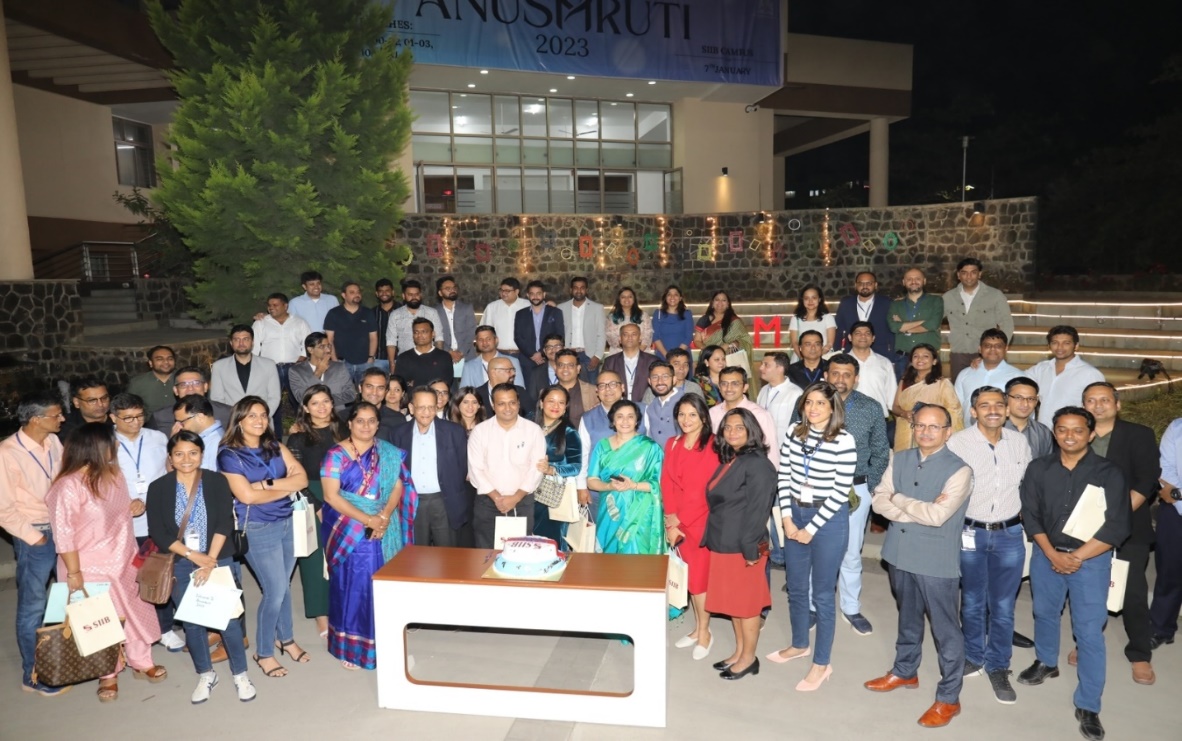
7Q. What is your take on Al and its role in influencing and impacting education, be it for learning or assignment purposes?
Ans: Though these may seem like minor issues, they combine to create significant challenges, especially in education. When the COVID-19 pandemic forced us to shift to online learning, we realised our lack of preparedness. However, with the introduction of ChatGPT, we’ve established new rules. We conduct continuous evaluations throughout the semester, including various assignments such as quizzes, group presentations, and group assignments. Quizzes pose no issues as they happen in real-time. Regarding assignments, whether before or after ChatGPT, we’ve noticed that group assignments, with a mix of individual and collaborative work, often result in copying. To combat this, we employ plagiarism detection software like Turnitin.
A significant change we’ve made is mandating that at least one major component of assessments must be a traditional pen-and-paper examination. We noticed that, due to the convenience of online exams during the pandemic, many students lost the ability to write effectively. This shift in the mode of assessment was particularly noticeable for the 2024 batch, which struggled with the transition. We believe that maintaining a balance between online and traditional assessments is crucial for ensuring students can still demonstrate their abilities in both formats.
While AI like ChatGPT can streamline administrative tasks and reduce monotony, we’re cautious about overreliance in the education sector. It’s essential to maintain critical thinking skills and not become overly reliant on technology. Our approach includes a mix of individual and group assessments, including presentations, case studies, and quizzes, to ensure a comprehensive evaluation of students’ abilities. This approach may seem complex, but it’s necessary to stay ahead in this tech-savvy generation, and it challenges us to find creative solutions to address these issues.
8Q. Your insight on advocating for B-schools to foster independent thinking rather than dependence on external sources is thought-provoking. From your perspective, what strategies can be implemented to nurture a culture of critical thinking among students?
Ans: Yes, there have been instances where students have sought more challenging academic experiences. I recall a particular student who approached me while I was teaching business statistics and operations research, which are known to be quite demanding subjects. Typically, I don’t encounter many challenges in my classes, but a few years ago, a student came to me and expressed dissatisfaction with the exam paper I had prepared. I explained that the paper was designed for the entire class, but I was willing to provide a more challenging one if they were up for it. To my delight, they accepted the challenge, so I created a separate assignment for them. Unfortunately, they found it quite difficult and expressed their struggles.
Such instances are rare, but when students genuinely seek more complexity and rigour, we encourage them to explore research opportunities. Research is a significant aspect of our academic institution, and we encourage interested students to collaborate with faculty members on research projects of their choice. Additionally, we promote the pursuit of extra certifications. For instance, students specialising in finance may be encouraged to pursue certifications like CFA or CPA. Similarly, students in operations management have access to relevant certifications.
We also offer free subscriptions to Coursera for all our students, giving them access to numerous courses with certifications, which are covered by the institution’s expenses. We understand that students may come from diverse academic backgrounds, and some may lack exposure to certain areas such as coding, AI, or machine learning. We recommend relevant certifications to bridge these knowledge gaps, as our primary focus is on managerial courses. Live projects are another option we encourage students to undertake in addition to the regular summer internship programme. Engaging in multiple live projects can significantly enhance their resumes and overall skills.
9Q. Isn’t it unusual for institutions to exhibit the same level of flexibility and accommodation as yours when a student akin to the one in this noteworthy story expresses a yearning for a more demanding academic experience? It’s uplifting to note that you not only supported the student but also went the extra mile to craft a custom paper, a rarity in today’s educational milieu. Do you think such interactions are becoming less prevalent in contemporary education?
Ans: The challenge, as I see it, is that many individuals nowadays tend to shy away from seeking challenges. It appears that people generally lean towards quick and straightforward solutions, often bypassing the time and effort required for mastery, a process that can span years. In today’s world, companies that actively encourage such dedication to mastery are becoming increasingly rare. To tackle this issue, we’ve implemented two mentorship programmes.
Firstly, there’s a faculty mentorship programme where each student is assigned a faculty member, preferably of their choice. Given our limited faculty, each faculty member typically mentors 10 to 15 students. Additionally, we take pride in being one of the few institutes in the country to launch an alumni mentorship programme. With over 4,500 alumni worldwide, this programme enables current students to connect with senior alumni in their chosen domains. The aim is for students to glean insights from the journeys of these successful alumni. The programme operates online, providing a list of alumni mentors and their LinkedIn profiles for students to choose from.
They have the autonomy to select their preferred mentor, and the programme involves at least three to four interactions during the semester. Although relatively new, with just two years under its belt, we have ambitious plans to expand it further. The mentorship relationship holds significant power because a deeper connection and relatability are established when the advice comes from an alum who was once in the students’ shoes. Students benefit from having two mentors—a professor and an alum—allowing them to openly discuss concerns and doubts, fostering a valuable and open relationship.
10Q. Could you share your insights, Dr. Chitnis, on the skills and qualities that contemporary employers seek in MBA graduates when making hiring decisions in today’s job market?
Ans: I firmly believe that when it comes to hiring, recruiters are primarily in search of the right attitude in candidates. This is particularly crucial as the job landscape swiftly evolves, and possessing the right mindset is paramount. While a fundamental understanding of field-specific concepts is important, recruiters place a greater emphasis on the right attitude and approach. They also highly value core values in candidates, such as authenticity and a genuine eagerness to learn. Additionally, recruiters are increasingly looking for candidates who exude energy and enthusiasm. In today’s world, where a significant portion of our lives is spent in front of screens, face-to-face interactions have become limited, and individuals may find it challenging to express themselves effectively in person. This phenomenon presents a challenge for both candidates and recruiters.
Recruiters seek candidates who can communicate effectively, be authentic, stay relevant, and demonstrate a strong willingness to learn—qualities highly prized by employers. We, as an institution, place significant emphasis on grooming our students in these aspects. Regular discussions, mentorship opportunities, and guidance from both faculty and alumni contribute to their development.
From my perspective, authenticity holds the utmost importance. I prioritise it because if a person is genuine, other skills can be taught and developed. Flexibility and a robust willingness to learn are also indispensable qualities that recruiters value. With these two qualities in place, other attributes fall into alignment. Energy is another crucial factor, given the demands of the contemporary workplace.
Ultimately, if a recruiter perceives insincerity in a candidate, it can overshadow other qualifications and achievements, such as a high GPA. The ability to convey genuineness and authenticity is critical. We consistently discuss and underscore these qualities in our commitment to preparing students. As educators, we lead by example, demonstrating the importance of these attributes. We promote transparency and fairness in our interactions with students, cultivating a sense of trust and accountability. Facilitating interactions between students and professionals from diverse fields is another aspect of our efforts, exposing our students to real-world experiences and expectations.
These interactions offer invaluable insights and bridge the gap between academia and the workplace. Through various tailored MBA programmes, we ensure students have opportunities to interact with professionals via workshops and events, aiding them in acquiring relevant skills and understanding employer expectations. In conclusion, I believe in fostering a collaborative environment where everyone—students, faculty, and companies—shares the responsibility for the success of our students. It’s a collective effort to prepare students for the workforce, and we take this responsibility seriously.
11Q. In your opinion, what are the two hidden advantages of SIIB that many students may not be aware of but should know?
Ans: I believe that SIIB is a unique institute where all stakeholders are actively engaged. This includes faculty, staff, students, alumni, and even recruiters. For me, the entire journey is of utmost importance. My focus is on nurturing individuals who will be genuinely good human beings. To be honest, that’s my top priority. The monetary package a person receives comes second. While a good human being may not start with a very high salary, I’ve witnessed numerous examples of students who have achieved significant success within 5 to 10 years of graduating. They make us exceedingly proud.
A fast-track journey may only sometimes be beneficial in the initial stages because one should savour and appreciate every small experience. That’s how my journey began. There is a time for everything. If you attain everything in one go, you might lose interest. I strongly believe in the value of hard work and that there are no free lunches, nor should there be. Our primary emphasis is on developing an individual’s character. We don’t just impart knowledge; we also emphasise that there’s much more to enhancing one’s personality. People should take notice of you for the right reasons. I often tell my students that others should look at them twice, remembering them for positive reasons. This, in my perspective, is character development, not merely a study in business. This is the first point.
Additionally, when I speak about character development, I stress the importance of managing one’s mental and physical health. I’m a staunch advocate for both physical and psychological well-being. This is where ‘walk the talk’ truly matters. I have seen recent instances of younger generations experiencing heart attacks and significant health issues. If you’re not physically and mentally fit, accumulating wealth becomes meaningless. While every business school may have similar programs and curricula, I believe this specific aspect of life, physical and mental health, is often overlooked. This is something very close to my heart, and I actively promote it. These are the two secret ingredients that I believe will serve students well in the long run, even if not immediately.
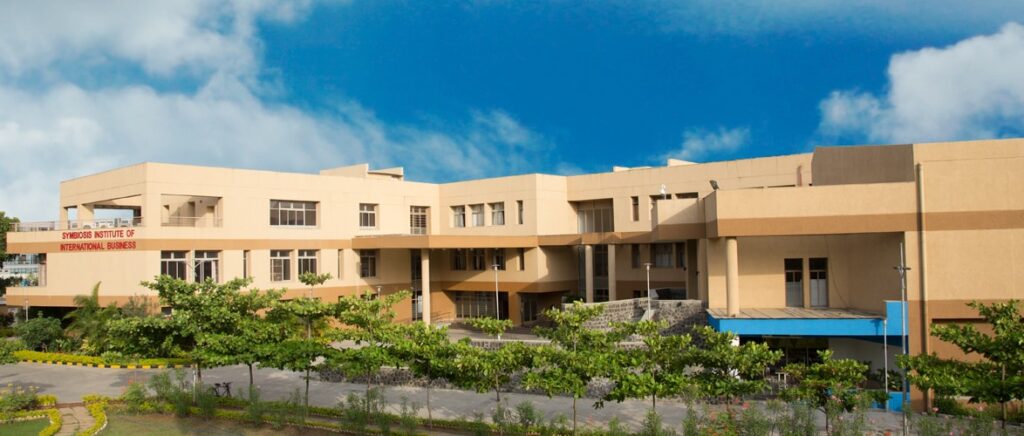
12Q. How do you personally or professionally define success?
Ans: I believe that success is all about realising one’s dreams and attaining personal goals, regardless of their size or scale, even the smallest aspirations. Take, for instance, a school-going child receiving a toy of their choice; in their eyes, that can be considered a significant success. Similarly, for someone aspiring to secure admission to an IIT, reaching that milestone is their version of success. I hold the belief that it’s crucial for every individual to have a set of goals, work diligently towards them, and cultivate patience. On a personal level, success, for me, encompasses achieving even my daily physical exercise routine. Though it might seem small, it holds great significance and fulfilment. This perspective on success is what intrigues and motivates me.
13Q: We have observed a trend among MBA aspirants where students put forth significant efforts to secure admission to an institute but display a reluctant attitude post-selection, relying heavily on the business school’s reputation for career opportunities. Have you also noticed this behaviour, and what is your perspective on it?
Ans: I believe that a sense of entitlement emerges once students gain admission to the programme. They think, “I’m here, so I should automatically secure opportunities.” In reality, they should understand that admission grants them the chance to participate in certain company processes, but it’s their responsibility to excel and secure a job.
My role is to bring companies to campus, but their performance starts when they must seize these opportunities. I often communicate this to my students, recognising their unique generational language.
I emphasise that it’s their duty to convert these opportunities into jobs, as companies won’t come and leave empty-handed. The immense pressure from parents, relatives, and self-expectations can lead to burnout, which starts even before they enter the MBA programme. While there is a sense of entitlement, they need to realise that they have to work diligently to make the most of their opportunities.
I am concerned about when this indoctrination happened, leading students to believe that they don’t need to work hard after admission. This phenomenon is more pronounced in postgraduate programmes, which they chose voluntarily. I haven’t entirely figured out the psychology behind this shift. In the past, a higher percentage of students were serious, but that percentage is decreasing. Not everyone is affected, and some remain highly focused. However, the seriousness often kicks in when they see their peers getting placed, and that’s when the real learning begins.
14Q. What IS SIIB doing to keep up with innovation and industry trends?
Ans: We’ve been successful in implementing changes to our curriculum regularly. As a result, recruiters have started to recognise and appreciate our efforts. This has led to students securing jobs in various domains, particularly in areas like ERP. We have a University Alliance programme with SAP, and now companies are recognising the value of this program and are actively seeking candidates with expertise in ERP. We’ve also integrated business analytics into our curriculum, making students more attractive to companies in need of those skills. Additionally, we emphasise knowledge in AI and ML, Power BI, and other technologies, and while we don’t provide direct training in these areas, we encourage our students to obtain certifications in these domains.
15Q. What recommendations and guidance do you have for MBA aspirants who are considering SIIB as their potential choice and are interested in applying this year?
Ans: I believe that MBA aspirants need to understand that it’s common knowledge that when a student enrols in a programme, and it’s time to choose their specialisation, their future career comes into play.
Regardless of age, whether in the 22–30 age group or beyond, there’s an overwhelming amount of information that can be quite confusing. My suggestion to these aspirants would be that they must prepare for the demanding academic routine that lies ahead, a principle applicable to any chosen business school. Understanding the nature of the academic journey is key. If I lean towards logical thinking, a marketing or sales role involving extensive communication might not align with my strengths. Assessing one’s mindset and finding a specialisation that matches one’s passion is vital.
I believe passion is essential for success, given the inherent pressure in prestigious business schools and the expectations from peers and parents. Having a clear vision of my career goals and acknowledging that success has no shortcuts is paramount. Before making any decisions, thorough research is indispensable. Online resources offer a wealth of information about brands, campuses, and placement records. Engaging with current students can provide valuable insights and perspectives.
For those seeking an international perspective, consider SIIB. Our curriculum, distinct from traditional business schools, focuses on international business. Every student learns a foreign language and gains an international perspective within their chosen specialisation. This unique approach, with approximately 33% of our alumni working abroad, positions them as highly sought-after candidates for international assignments. SIIB equips students with knowledge about international cultures and practises, providing a significant edge in the evolving landscape of global business.
In conclusion, my suggestion to prospective students and their parents is to explore and expand their horizons, with SIIB standing out as an excellent choice for those interested in international business.
Our interview with Dr. Chitnis has unveiled her steadfast dedication to cultivating an environment of knowledge, innovation, and a global perspective at SIIB. With her wealth of experience and expertise, coupled with a fervour for performance evaluation, benchmarking, and forecasting, she stands as an inspiring figure for both faculty and students. Under her guidance, SIIB remains a stellar choice for MBA aspirants seeking an education that not only imparts knowledge but also instills values and global competencies.
Dr. Chitnis’s vision and unwavering commitment reinforce SIIB’s standing as an esteemed institution, providing students with the tools and perspectives essential for success in the ever-evolving world of international business. As we conclude our conversation with Dr. Asmita Chitnis, our heartfelt gratitude extends to her for sharing valuable insights and providing exemplary leadership. Her journey, accomplishments, and passion for education embody the ideals that distinguish SIIB as a top choice for those aspiring to excel in the field of international business.
It is evident that, with Dr. Chitnis at the helm, SIIB is poised to continue its legacy of excellence, nurturing the leaders of tomorrow and preparing them for the global challenges that lie ahead.
To know more about SIIB Pune, view this insightfiul video on life at campus – SIIB, Pune:
Also Read:
We’d like to thank all of our wonderful readers for your incredible support and enthusiasm for this interview. We’re thrilled to have you as a member of our PG community, and more interesting content is on the way. Return to our platform for more great articles, and don’t forget to check out what we’ve recently published. Have fun reading!
